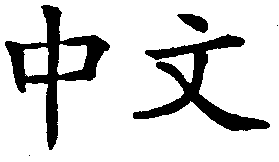Chinese Language posts
Saturday September 01, 2018
Real Simple
In “Oracle Bones: A Journey Through Time in China” (much recommended), Peter Hessler not only gives us a great boots-on-the-ground perspective of a burgeoning China in the late 1990s and early ‘00s, he explains what I’ve long wondered: Why did Communist China simplify Chinese characters? What was that about?
 It was about losing face. Apparently many in 19th-century China felt that part of the reason it had been overwhelmed by the western powers was its language. Even Lu Xun, regarded as one of China's greatest authors, recommended a shift to the Latin alphabet.
It was about losing face. Apparently many in 19th-century China felt that part of the reason it had been overwhelmed by the western powers was its language. Even Lu Xun, regarded as one of China's greatest authors, recommended a shift to the Latin alphabet.
“If we are to go on living, Chinese characters cannot.... The characters are a precious legacy handed down by our ancestors, I know. But we can sacrifice our inheritance or ourselves: which is it to be?”
Once Mao Zedong came to power in 1949, he issued an edict to reform the Chinese language—but not necessarily by going Latin. He wanted the new Chinese alphabet to be phonetic, national, and based on existing Chinese characters.
Didn't turn out that way. From Hessler:
In 1955, the reform committee narrowed the field to six alphabetic finalists. One system used Cyrillic letters, and another used the Latin alphabet. The other four finalists were completely new “Chinese” alphabets that were based on the shapes of characters. But a year later, Mao and other leaders decided that the Chinese alphabets weren't yet usable. They sanctioned the Latin system—the one known as Pinyin—for use in early education and other special purposes, but it wasn't granted legal status. Meanwhile, they decided to simplify a number of Chinese characters, reducing the stroke counts. ... A total of 515 characters were simplified, as well as a number of radicals. At the level of individual characters, it was a significant change, but the basic writing system remained intact.
Rather than revamp the whole system, they nipped and tucked. That's why we got what we got.
Some of the changes make sense to me. In the past, if you wanted to write “a few,” jige, it would be this:
幾個
Now it's this:
几个
Not prettier but a helluva lot quicker.
But I still can't get over dong: “east.” It used to be balanced and indicative of what it represented: a rising sun:
東
Now it's this:
东
What is that? Looks like the Fantastic Four signal got caught in a strong crosswind. I never remember how to write it. It's just ugly.
I know: I with no rights in this matter: Neither Chinese nor living in China.
Thursday May 24, 2018
Muscle Memory
Still practicing my Chinese—slowly but way not-so-surely—and was working on gei or “to give.” Wo gei ni kahn, etc. This is that character:
给
Oddly, though, every time I'd begin, rather than a straight line under the radical, the part on the left, I'd add three vertical dashes. I did that like three or four times, again and again, chastising myself all the while. “Where did that come from?” I wondered.
It came from the past. It came from muscle memory. Because that's how the traditional character, which I learned 30 years ago, is written:
給
I do think China screwed up a lot of characters when they simplified. For example: This is ur, or “son,” first as traditional and then as simplified:
兒 vs. 儿
The traditonal always reminded me of a wobbly-headed kid on splindly legs. That's how I always remembered it. It looks like what it is, and it's kinda cute. Don't know what to make of the simplfied version. Just legs? Like spider legs? I'm getting nothing here.
They also butchered dong, or “east”:
東 vs. 东
The first is a rising sun, which, you know, makes sense. The second is ... what ... the Fantastic Four signal? I‘ve got no clue. It’s lopsided, too. I hate writing that character.
I know: Who am I to criticize. 我是什么东西?
Friday May 11, 2018
My Hobby
In the new session of my weekly Chinese class at the downtown Seattle library, our teacher asked for volunteers to present on one of three topics, and I went with the “My Hobby” option. “Hobby,” I quickly learned, is translated as two familiar characters: 爱好. love/good.
In Taiwan, 30 years ago, I learned traditional characters, and now I'm learning the simplified versions, and this was the first time I'd noticed the difference in “love.”
This is the traditional Chinese character for love: 愛.
And this is the modern simplified version:爱
It may be tough to see the difference, but here it is: They took out 心.
What's that? Xin. It means heart. That's right. To simplify “love,” they took out “heart.” Not sure who was on that committee, but, as we say today, the optics aren't good.
My presentation is below. It's about movie box office, particularly Chinese movie box office—a topic that was way too difficult given my level. Put another way: You have no idea how much work went into sounding this stupid.

China is about to become the world's biggest movie market.
我很喜欢看电影。我小的时候,我爸爸在明尼苏达报纸写电影评轮。这是他的工作。 不错。
我也写电影评论 。十五年以前,我给西雅图时报写过。 现在,我用我的博客。
我也觉得电影票房很有趣。 “为什么很多人要看这部电影?他们要什么?”
今年, 我听说, 中国票房比美国票房大。
中国票房最大的电影是。。。
- 战狼II (2017): $854 million
- 红海行动 (2018): $579 million
(它们都发生在非州。为什么? 这个。)
- 唐人街探案 2 (2018): $541 million
- 美人鱼 (2016): $526 million
我最喜欢的中国电影是。。。
- 一一 (Edward Yang)
- 饮食男女 (Ang Lee)
- 警察故事,第一,二, 三 (Jackie Chan)
- 功夫(Stephen Chow: 在美国是“Kung Fu Hustle”)
- 巴尔扎克与小裁缝:Balzac and the Little Chinese Seamstress
All previous entries
Baseball's Active Leaders, 2023
What Trump Said When About COVID
Recent Reviews
Everything Everywhere All at Once (2022)
Black Panther: Wakanda Forever (2022)
Doctor Strange in the Multiverse of Madness (2022)
Spider-Man: No Way Home (2021)
The Cagneys
A Midsummer Night's Dream (1935)
Something to Sing About (1937)
Angels with Dirty Faces (1938)
A Lion Is In the Streets (1953)
Man of a Thousand Faces (1957)
Never Steal Anything Small (1959)
Shake Hands With the Devil (1959)







